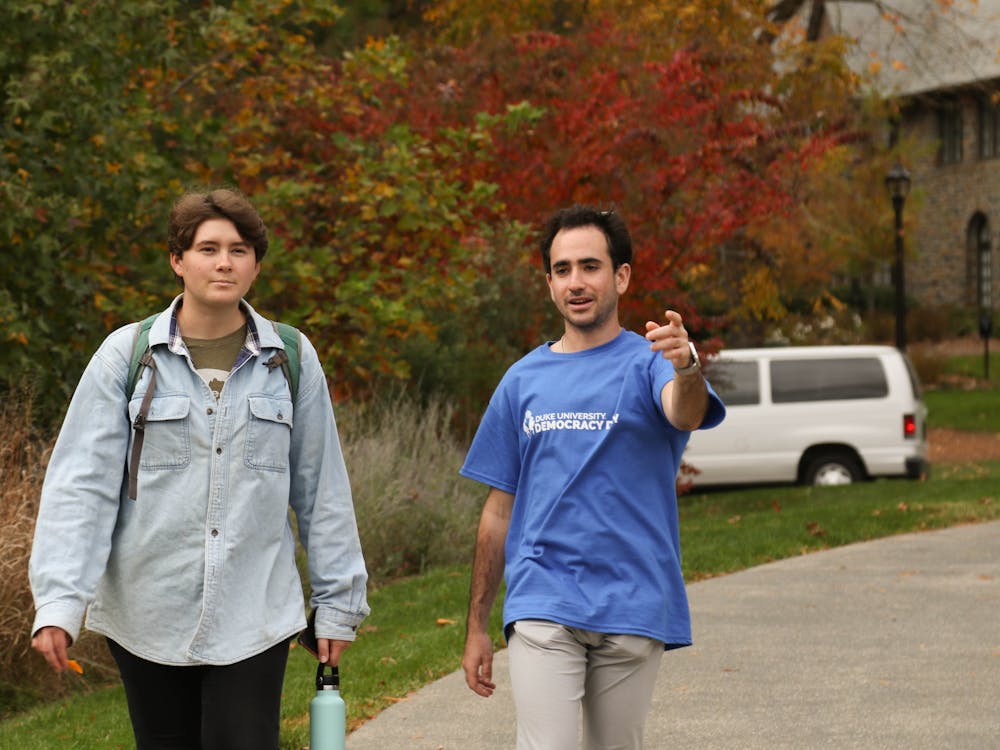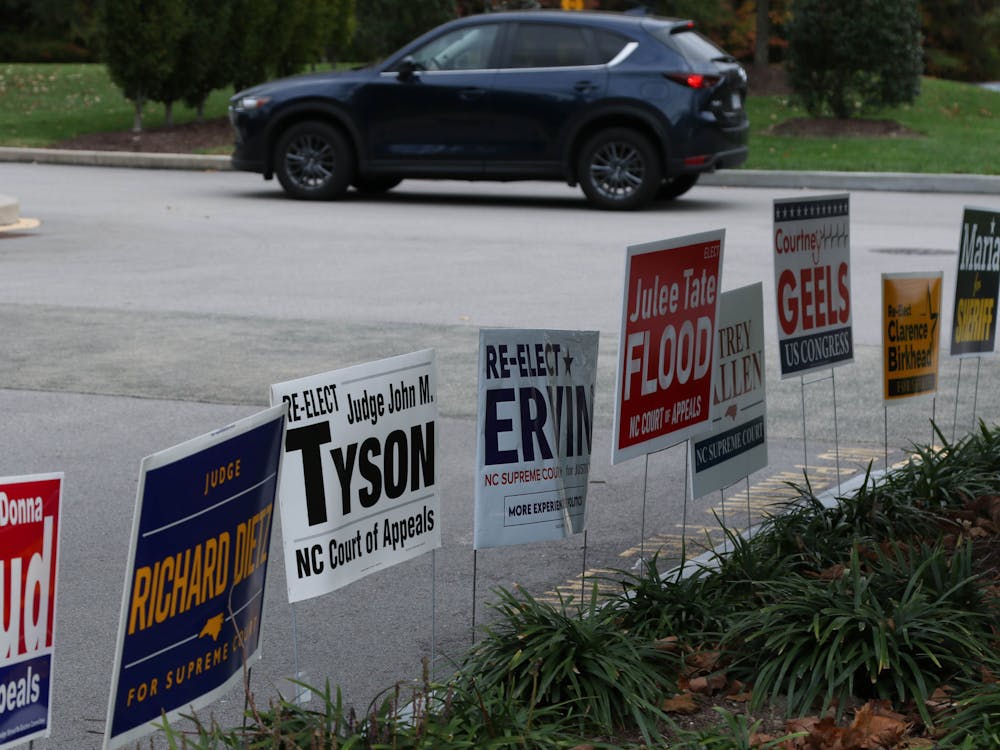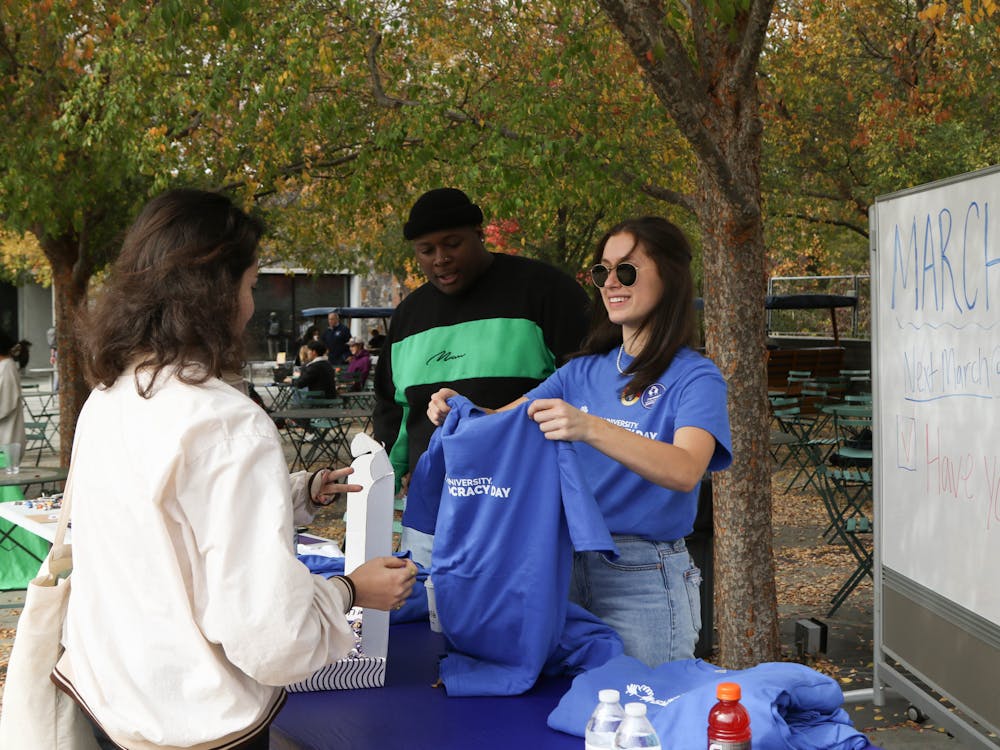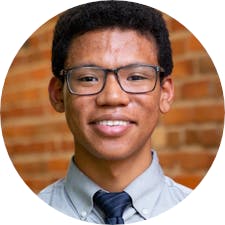The North Carolina Young People’s Voting Alliance and Duke Votes collaborated to plan Duke Democracy Day, an Oct. 28 event intended to motivate students to vote in the upcoming midterm elections and engage in local, state and national politics.
“I think convincing students that their vote matters and is important has been a challenge in midterms, without a president at the top of the ticket,” said senior Jonah Perrin, Duke Votes chair and one of the event organizers, in a release.
Throughout the day, musical groups performed at the early voting site at Karsh Alumni and Visitors Center. Speakers included Michael Steele, former Republican National Committee chairperson, lieutenant governor of Maryland and member of the Lincoln Project, as well as Durham At-Large City Council Member Jillian Johnson, Trinity ‘03, and four state legislators.
From the Bryan Center Plaza to the Fitzpatrick Center, events across campus highlighted the importance of Duke students' voices, urging them to cast their ballots in this election.

Kenneth T. Schiciano Auditorium B, 2:00 p.m.
Steele spoke on the importance of conviction in politics in a talk entitled “The State of Democracy."
“If you’re not willing to stand up for what you believe in, then sit down until you are,” he said. “That’s what the test of democracy is right now, for all of us.”
Steele, who drew criticism from Republicans for supporting Joe Biden during the 2020 election, stressed the need for politicians to prioritize country over party, especially to preserve democracy. Drawing on his experience in political leadership at the county, state and national levels, he spoke about balancing partisanship with personal responsibility.
“I didn’t see the [Republican] party in the same way that a lot of my friends and colleagues did. That was their home … Yeah, we’re in it together, but if you go down the wrong street, I’m not going with you. I’m not going down that wrong road,” Steele said.
A central theme was the role of values and urgency in driving political change, both among voters and politicians.
First-year Peter Banyas was one of the attendees at Friday’s talk. “Today, I think one of the most important points he talked about is how individuals actually go and decide to vote — whether it's based on issues or principles of constitutional democracy,” he said.
The former RNC chairman also described the rise of extreme views on the left and right as “two sides of the same coin.” The same principles animating polarization on the right, embodied by politicians like former President Donald Trump, are driving the rise of extreme views on the left and may threaten to destabilize the Democrats, according to Steele.
Steele emphasized that individual concern and civic engagement are key to combating the rise of extremism and restoring American democracy.
“At the end of the day, your civic responsibility begins and ends with you and whether or not you think it’s real enough for you to participate,” Steele said.
Fitzpatrick Center, 3:15 p.m.
The chilly fall wind persuaded most walkers standing outside Fitzpatrick Center after Steele’s talk to sport jackets and long sleeves. But sophomore Mick Tobin seemed unfazed in his bright blue Democracy Day t-shirt.
“We have got a lot going on today,” he said. “We want to find new ways to keep people engaged.”
Get The Chronicle straight to your inbox
Sign up for our weekly newsletter. Cancel at any time.
Tobin, a Duke Student Government senator for campus life, is one of the organizers behind Democracy Day. As the co-founder and operations director for the nonprofit North Carolina Young People’s Alliance, he works to civically engage students across seven universities in North Carolina.
“Right now we’re seeing record-high political disillusionment. A lot of people just feel paralyzed and have given up on the political process,” Tobin said. “Democracy Day is about empowering those people, giving them an opportunity to go out to vote, giving them an opportunity to engage with the community.”
He hopes that the day-long event will address “present bias,” which can lead busy college students to put off voting or engaging with politics.
But for Tobin, voting is just the start. He and his co-organizers hope to keep the momentum moving, beyond the polls and into active stewardship of American democracy. Public figures like Steele model that “commitment to the integrity of our democracy,” Tobin said.
“We need people to stand up for democracy. And I think it’s really important for young people as well as for the future of the country to hear that message, and to interact with that,” he said.
The bottom line: “Go vote,” Tobin encouraged. “Have faith, don’t give up, keep pushing.”

Karsh Alumni and Visitors Center, 3:22 p.m.
The political signs lining the entrance to the Karsh Alumni Center competed for the attention of the voters trickling into the parking lot.
As juniors Jess On and Pilar Kelly and senior Mary Kim approached the Alumni Center, “VOTE HERE” signs pointed them to the polls. On explained that she had spent the day asking people about their voting plans before heading over from West Campus with Kelly and Kim.
The trio and other voters were greeted by volunteers making a last-minute pitch for their candidates. The voting area was marked by a huge screen which read, “Thank you for voting,” against an American flag backdrop. After a five-minute line, they were able to register to vote, update their registration and cast their ballots.
“The poll workers were very, very helpful, and very sweet,” On said after voting. “It was really great to see especially older folks still mobilized in the effort to vote.”
In the parking lot across from Karsh, voters were able to grab free tacos, ice cream, T-shirts and stickers as local artists played live music. The scene felt closer to a tailgate than a voting site, as photographers snapped pictures of students sitting on the stoop or enjoying the music.
“I thought it was really cool because it kind of made voting into more of an experience,” On said. “It was a cool way of getting people motivated to vote, because sometimes people need an incentive.”

Bryan Center Plaza, 4:30 p.m.
In some ways, the table, complete with a box of Insomnia Cookies, felt like one you would find on any afternoon on the Bryan Center plaza. But Democracy Day was different — instead of club leaders drawing in students to chat, the table was staffed by city and state elected officials.
“It's wonderful to be here talking to students, talking about issues, making sure everyone's registered and voting,” said NC House Representative Marcia Morey for District 30 after answering a student’s question about the location of the polls. Morey represents the Duke campus area in the state house.
Nearby, NC State Senators Mike Woodard, Trinity ’81, who represents District 22, and Natalie Murdock, who represents District 20, sat at a table with councilwoman Johnson to share what brought them to campus for Democracy Day.
Woodard, an alumnus and former employee of the University, hoped to “encourage Duke students and the whole Duke community, [and] make sure they get out and vote, especially during early voting.”
Johnson added that young people are underrepresented among Durham voters and have been the target of voter suppression.
“[Young people] are not participating in the same numbers as we see older folks, and that has a real impact on democracy and all the issues that are important to our elected officials,” she said. “People who want to suppress the vote have tried to prevent students from voting, because their voices and votes are so important.”
Voter suppression has historically been an issue in North Carolina, and state courts have recently thrown out gerrymandered maps made by the state legislature. All four NC elected officials underscored that awareness and outreach can overcome these barriers.
When asked what message they would want a Duke student to walk away with today, Sen. Murdock immediately responded: stay active.
“Do not wait for the election,” she said. “Whatever issue it is that you care about, we’re here. We are a very engaged group of elected officials. Our doors are always open.”
“I'd remind the Duke community that early voting continues to next Saturday,” Sen. Woodard remarked. “There’s really no excuse for students, faculty and staff [not] to go down to Karsh and cast their vote between classes, on a lunch break, or after work.”
Rep. Morey would remind students that democracy is precious. “Too many people take voting for granted, and we can’t,” she said.
Anisha Reddy is a Trinity junior and a senior editor of The Chronicle's 118th volume.

Senou Kounouho is a Pratt sophomore and a university news editor of The Chronicle's 119th volume.

